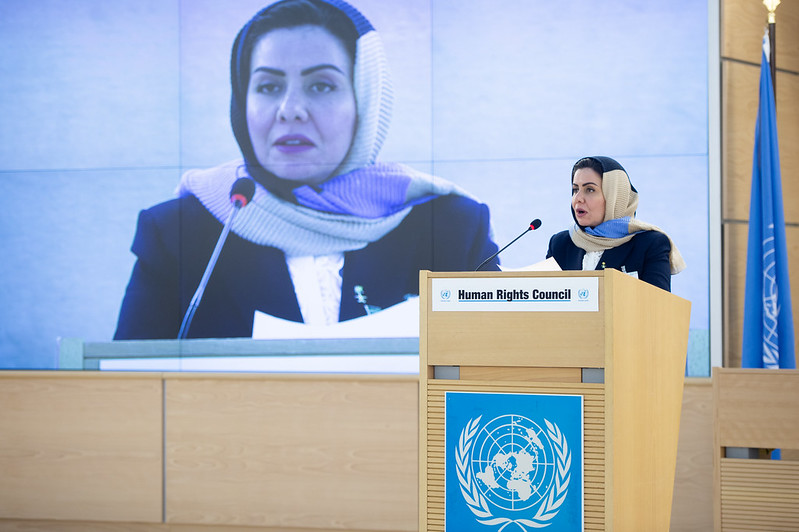November 27, 2023
Ahead of the third human rights dialogue between the European Union (EU) and Saudi Arabia on November 28, 2023, MENA Rights Group, ALQST for Human Rights and the European Saudi Organisation for Human Rights (ESOHR) urge the EU to reconsider its interlocutory, the Saudi Human Rights Commission (SHRC). The NGOs have released a report, “The Saudi Human Rights Commission: a Whitewashing Tool for the Kingdom”, finding substantial and undeniable evidence that the Commission acts as a tool to gloss away the Kingdom’s poor human rights record and cover up gross abuses. The report further analyses the SHRC’s legal framework, composition, partnerships and actions, raising serious concerns about its independence and effectiveness.
Established in 2005, the SHRC’s stated objective is to protect and promote human rights within the Kingdom and as such, is mandated to address complaints, engage in legislative work and monitor places of detention, among others. The Commission further claims to be an independent entity capable of holding the government accountable for violations committed.
This criteria of independence and impartiality seems to echo the international standards set out in the Paris Principles, which are binding to National Human Rights Institutions (NHRIs) which have sought accreditation from the Global Alliance of NHRIs. However, the SHRC has never sought such accreditation despite past commitments from Saudi authorities to have the Commission seek accreditation and effectively comply with the Paris Principles.
On the contrary, the Commission’s independence continues to be severely compromised by the fact that the SHRC reports exclusively to King Salman, who directly appoints its members. A large portion of its commissioners also have close ties with the government, which undoubtedly jeopardises its mandate to hold authorities accountable.
In addition, the NGOs found that over the last few years, the Commission has played a central role in providing an inaccurate depiction of the abysmal situation in Saudi Arabia. At no point has the Commission denounced the considerable shrinking of civic space over the past years, the crackdown on any form of public dissent, particularly since the ascension to power of Crown Prince Mohammed Bin Salman (MbS), and the rampant practices of enforced disappearance, torture and arbitrary detention.
Despite reports to the contrary from the former Special Rapporteur on extrajudicial, summary or arbitrary executions, the SHRC has lauded Saudi authorities for the outcome of the trial of Jamal Khashoggi’s murder, portraying it as evidence of the impartiality of the judicial system. The SHRC has also openly denied the Saudi government’s involvement in this brutal murder and referred to it as an “unfortunate incident”.
The Commission’s denial of such abuses is most apparent with regards to women’s rights, as the SHRC has consistently denied the targeting of women human rights defenders and instead portrayed a progressive image of women’s rights in the country. In November 2018 and January 2019, several members of the Commission visited prominent human rights defender Loujain al-Hathloul, who testified to having been subjected to torture in detention by high-ranking officials. However, they failed to address her claims and instead participated in covering up these abuses and praising Saudi reforms.
A similar issue happened with Salma al-Shehab, who is currently serving a 27-year prison sentence for publishing tweets calling for women’s rights reforms in Saudi Arabia. Commission members, including the current serving President Hala al-Tuwaijiri, visited her in prison in June 2023. During the visit, al-Tuwaijiri simply brushed off all the concerns that were voiced by al-Shehab, including that she had not seen her children since her arrest two-and-a-half years prior, in January 2021.
Moreover, although executions have skyrocketed to an all-time high in Saudi Arabia, the Commission has consistently claimed that Saudi authorities is no longer executing minors. These claims are in stark contrast with reality. In 2021, Mustapha Hashem al-Darwish was executed for participating in protests as a minor. There are currently nine known individuals who are sitting on death row for such acts while still minors.
Despite these shortcomings, there has been an increasing regional and international engagement with the SHRC, which falsely presents it as a viable interlocutory and partner on human rights issues in Saudi Arabia. The EU, as well as the Office of the UN High Commissioner of Human Rights and other UN and EU agencies, have continuously engaged with the SHRC, despite the latter’s inability to operate impartially and independently.
“Continuing to consider it a viable interlocutor for future talks and programs only allows the SHRC to exploit such initiatives and perpetuate the whitewashing of human rights abuses in Saudi Arabia”, the group of NGOs denounce. “All EU and UN Member States, as well as UN bodies, must suspend all multilateral dialogues with the Commission until it demonstrates its ability to effectively and independently address the human rights situation in Saudi Arabia.”
“We hope with this report that all entities engaging and cooperating with the Commission will understand that they are also contributing to its recognition when instead it continues to function as a tool in the hands of the Saudi government to whitewash brutal crimes”, they conclude.







